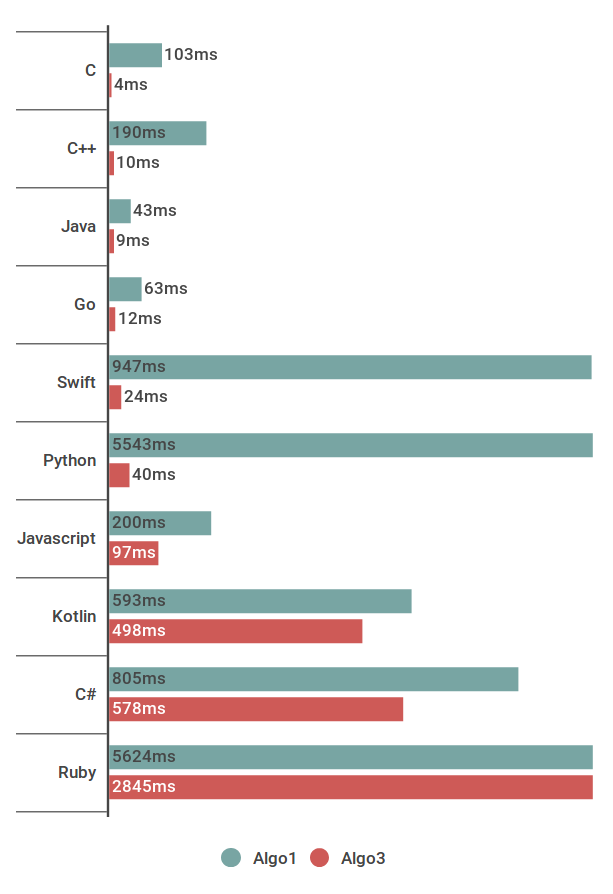折腾一个Two_Sum(中)
16 Jan 2018Two Sum题干和又一次失败:
Given an array of integers, return indices of the two numbers such that they add up to a specific target. You may assume that each input would have exactly one solution, and you may not use the same element twice. Example: Given nums = [2, 7, 11, 15], target = 9, Because nums[0] + nums[1] = 2 + 7 = 9, return [0, 1].
上次我的最天(bai)真(chi)解法,所有都通过了,除了Python3运行超时。没放弃,如果简单写两层for循环注定超时,那还有一个尝试项——用它的迭代器模块itertools。如果模块内部有优化的话,可能可以以语言的优秀特性来弥补思维上的不聪明。
Python3.x解一之itertools:
class Solution:
import itertools
def twoSum(self, nums, target):
"""
:type nums: List[int]
:type target: int
:rtype: List[int]
"""
comb = itertools.combinations(nums,2)
res = [x for x in comb if sum(y for y in x) == target]
i = nums.index(res[0][0])
j = nums.index(res[0][1],i+1)
return [i,j] 如果输入nums=[3,3],target=6,原来程序会返回[0,0],但正确的结果是[0,1],因为nums.index[3]返回0,后来发现index的第二个参数——开始搜索的下标,所以把它设成上一个结果的下标+1就可以得到第二个3的期待下标了。
Performance: Time Out
还是超时了,至少知道了python里的itertools并没有优化。
现在就正式从数据结构上进行优化了,这到底是个什么问题,是搜索问题啊,过去我用了“挨个搜索”的遍历。现在想想我有什么要什么,有无序数列,要搜索,找下标,散列表浮现眼前,花费空间来优化时间,可以把时间复杂度从O(n2)降低到O(n),散列表要存n个数值-下标对,空间复杂度从O(1)上升到O(n)。
C++解二——数据结构优化——2-Pass Hash Table:
class Solution {
public:
vector<int> twoSum(vector<int>& nums, int target) {
vector<int> result;
map<int,int> hash_table;
//two-pass
for (int i=0; i<nums.size(); i++){
hash_table[nums[i]] = i;
}
for (int i =0; i<nums.size()-1; i++){
int location = hash_table.find(target-nums[i])->second;
if(location !=i && location != hash_table.end()->second){
result.push_back(i);
result.push_back(location);
return result;
}
}
throw std::invalid_argument("No solution");
}
};Performance: 19ms
上面的代码思路很简单,先构建数据结构后求解。用一个for循环来构建一个散列表。然后再用一次for来搜索求解。算上常数,时间复杂度是线性时间——2n。
算法问题上往往有“抖机灵”做法,透彻了解问题后然后想出解题思路,过程就是——想。
这道题里还可以“抖机灵”,我们需要完整的散列表吗?并没有,可以一边构建一边搜索,这样时间可以从2n下降到n,在设计算法时,时间复杂度往往是忽略掉常数项的,但在实战里,去掉一个for可以把运行时间减半。下面的代码就把运行时间从19ms减少到10ms。而空间上散列表的任务也从存储固定n对下降到最多n-1对。
C++解三——进一步算法优化——1-Pass Hash Table:
class Solution {
public:
vector<int> twoSum(vector<int>& nums, int target) {
vector<int> result;
map<int,int> hash_table;
//one-pass
for (int i=0; i<nums.size(); i++){
int location = hash_table.find(target-nums[i])->second;
if(location != hash_table.end()->second){
result.push_back(location-1);
result.push_back(i);
return result;}
else{
hash_table[nums[i]] = i+1;
}
}
throw std::invalid_argument("No solution");
}
};Performance: 10ms
三种算法的时间对比:

各语言的散列表实现:
下面是其他语言的解三。调用现成的HashMap函数(Dictionary),不研究散列函数和冲撞的处理。
Java解三:
class Solution {
public int[] twoSum(int[] nums, int target) {
Map<Integer, Integer> map = new HashMap<>();
for (int i = 0; i < nums.length; i++) {
int x = target - nums[i];
if (map.containsKey(x)) {
return new int[] { map.get(x), i };
}
map.put(nums[i], i);
}
throw new IllegalArgumentException("No two sum solution");
}
}Performance:9ms
Python2.x/3.x解三:
class Solution(object):
def twoSum(self, nums, target):
"""
:type nums: List[int]
:type target: int
:rtype: List[int]
"""
map={}
for i in range ( 0, len(nums) ):
x = target - nums[i]
if x in map:
return [map[x], i]
else:
map[nums[i]] = i
raise ValueError("No solution")Performance: python2 40ms python3 63ms
Javascript解三:
var twoSum = function(nums, target) {
var map = {}
for (var i=0; i<nums.length; i++){
x = target - nums[i];
if (x in map){
return [map[x], i];
}
else{
map[nums[i]]=i;
}
}
throw new Error("No solution");
};Performance: 97ms
Ruby解三:
def two_sum(nums, target)
map = {}
nums.each_with_index do |num, i|
key = ((map.select { |k,v| v == (target-num)}.keys))
key.empty? ? false : (return [key, i].flatten)
map[i]=num
end
return "No solution"
endPerformace: 2845ms
Go解三:
twoSum(nums []int, target int) []int {
m := make(map[int]int)
for i := 0; i< len(nums); i++ {
x := target - nums[i]
if _, ok := m[x]; ok {
return []int{m[x],i}
} else {
m[nums[i]] = i
}
}
return nil
}Performance: 12ms
Swift解三:
class Solution {
func twoSum(_ nums: [Int], _ target: Int) -> [Int] {
var map = [Int:Int]()
var result = [Int]()
for i in 0..<nums.count{
let x = target - nums[i]
if let j = map[x] {
result.append(j)
result.append(i)
return result
} else {
map[nums[i]]=i
}
}
return result
}
}Performance: 24ms
C#解三:
public class Solution {
public int[] TwoSum(int[] nums, int target) {
var map = new Dictionary<int,int?>();
for (int i=0; i<nums.Length; i++){
int x = target - nums[i];
if (map.ContainsKey(x)){
return new int[] { map[x].Value, i};
} else {
map[nums[i]] = i;
}
}
throw new ArgumentNullException("No solution");
}
}Performance: 518ms
注释:需要空间名称using System.Collections.Generic;
Kotlin解三:
class Solution {
fun twoSum(nums: IntArray, target: Int): IntArray {
val map = HashMap<Int, Int>()
for( i in 0..nums.size-1){
var x = target - nums[i]
if (map.containsKey(x)) {
return intArrayOf(map.get(x)!!,i)
} else {
map.put(nums[i],i)
}
}
return intArrayOf()
}
}Performance: 498ms
注释:Kotlin如果遇上type mismatch: inferred type is Int? but Int was expected,在确认数值非空的情况下,可以用操作符!!或者.safe()来转换成Int。
C里用数组假装散列表
如果这道题我需要它最快,不计代价地最快,那我有什么选项?
最快的搜索,所以用数组的offset,从地址直接得到值。代价是冗余内存,把数组长度控制在max=target-min,len=max-min+1
C解三:
int* twoSum(int* nums, int numsSize, int target) {
//Array to imitate a HashMap
int min = INT_MAX;
for (int i = 0; i < numsSize; i++) {
if (nums[i] < min)
min = nums[i];
}
int max = target - min;
int len = max - min + 1;
int *table = (int*)malloc(len*sizeof(int));
memset(table, -1, len*sizeof(int));
static int result[2] = { -1,-1 };
for (int i = 0; i < numsSize; i++) {
//ignoring outliner to save space
if (nums[i]-min < len) {
int x = target -nums[i] - min;
if (table[x] != -1) {
result[0] = table[x];
result[1] = i;
return result;
}
table[nums[i]-min] = i;
}
}
free(table);
return NULL;
}Performance: 4ms
注释:果然最快,这算法出处 雅可的博客 ,我改动了一下。 快是快了,击败了91.41%的提交,但是空间关联输入数据,不仅非常大,而且还有不可控的代价。
不专业分析:

算法上,是平方时间变线性时间的升级,C的那个浆糊法是无敌了,但Kotlin和C#的比较还真不够显著,Kotlin想必是虚拟机的关系。
其他:
- 发现一个学习
Go的好网站 Go By Example - 和语言方法查询网站 OverAPI
- 背景音乐:
Björk的 Utopia ,刷新了我的感官 - 下次还是这一题,我想研究一下不同的排序算法
如果有建议,观点或者问题的话,可以给我发邮件aileen365@gmail.com。